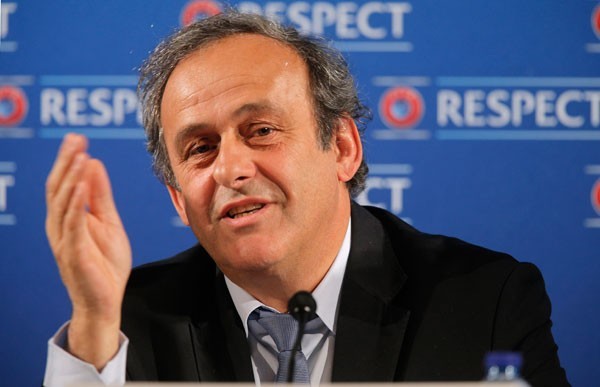Michel Platini has no time for politicians who call for sports boycotts of countries and events because of their impotence in their own sphere.
Platini, former France captain and coach and now president of European federation UEFA, found himself under such pressure before and during the European Championship finals in Poland and Ukraine two years ago.
The boycott issue has been revived after two United States senators urged that FIFA should strip Russia of its hosting of the 2018 World Cup finals because of the annexation of Crimea.
Platini, tasked on the issue at UEFA’s 60th anniversary congress in Astana, Kazakhstan, said: “They are always asking about boycotts and I get fed up with it.
“These people are never interested in the sport proper. I remember that politicians boycotted Ukraine during Euro 2012 but, when it came to the final of the competition, it seemed I saw the prime minister of Spain there and the prime minister of Italy.
“When you boycott things you need to boycott everything – embassies, air travel and so on. But the system is it’s just sport, sport, sport, that needs to apply boycotts. There are many people who don’t like sport who ask for these things.”
Recalling his own playing days, Platini said that he had been put under pressure not to play for France at the World Cup in Argentina which was then under a military regime.
He said: “In 1978 they asked me to boycott Argentina; earlier this year they asked me to boycott the Sochi Winter Games but my opinion is that I should go and speak my opinion.
“Politicians should take care of politics but sport needs to be a place of brotherhood which brings people together. I’m against boycotts. It’s better to go there and express your opinion than not to be there at all.”
On the theme of football as a vehicle for integration and education Platini announced the launch of a programme to set up and develop football academies for promising young players and the creation of a UEFA children’s foundation.
He also insisted that he Turkish football federation, and not UEFA, was responsible for domestic disciplinary action against matchfixing.
Last year UEFA suspended Turkish clubs Fenerbahce and Besiktas from European club competition for two years and one year respectively The bans were upheld by both the UEFA appeals commission and the Court of Arbitration for Sport.
Continuing controversy has raged in Turkey over the long-running matchfix saga which now dates back three years. Fenerbahce supporters have claimed that UEFA has no grounds to sanction a club which has not been subject to any punishment by its own federation.
Platini, asked about the apparent contradiction, said that UEFA had taken its own decision on the basis of evidence presented.
He added: “We have taken our responsibility regarding the clubs in UEFA competition. Afterwards this is a question for the Turkish federation. It’s their problem. You have to ask this the question of the president.”
Earlier UEFA Congress reiterated its opposition to all forms of corruption and racism by adopting Congress adopted an 11-point resolution entitled ‘European football united for the integrity of the game.’
Last year UEFA urged all governments to legislate against sports fraud. Reiterating the need for such a step, it added: “Football authorities are not equipped to solve the problem of match-fixing on their own.”
In addition to a betting fraud detection system and the establishment of the integrity officer network, UEFA has implemented a four-language hotline and, from July 1, will launch a seven-language integrity website to support the reporting process via UEFA.org.







